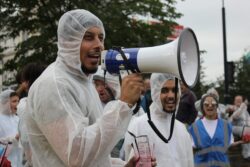Understanding the power of ‘Pragmatic Language’ for youth-led activism

Image credit: Common Wealth, reproduced with permission.
Understanding the power of ‘Pragmatic Language’ for youth-led, arts-based activism in and beyond Bradford
This project led by Paul Cooke (World Cinemas, LCS), together with Cécile De Cat (Linguistics), Karen Thornton (Bradford University) and political theatre company Common Wealth (Bradford and Cardiff) will be a pilot project looking at four key areas:
- new research insights that will feed into a current production it is developing with young people with experience of the criminal justice system (YPCJS) and people on probation (POPs);
- enable Common Wealth’s staff base to run participatory activities in the future
- build capacity in the organisation for supporting community-led filmmaking to significantly enhance its approach to local and national advocacy
- ensure the legacy of the planned cultural activities during Bradford 2025.
This pilot project is also designed to build the foundation of an on-going partnership. The project uses a Citizen Science approach for the investigation of ‘pragmatic language’ in adolescents, i.e., their ability to use and understand implicit meaning during social interaction. This aspect of language competence can be inclusive or exclusive of certain groups, and can, in turn, impact wellbeing. A number of standard tools exist to assess pragmatic language, but speech & language therapists working with adolescents find these tools inadequate for that age group, which is characterised by very different ‘norms’ to other age groups. Pragmatic language deficits (as standardly assessed) have a much higher prevalence in young offenders than in the population as a whole. It is essential to understand the extent to which this would also be true according to the norms defined by young people themselves.
The team will work with two groups of young people over a series of workshops to produce videos that present their perspective on this issue. The aim is to get young people to define for themselves what they consider ‘healthy pragmatic language’, to better inform the norms and their assessment.
